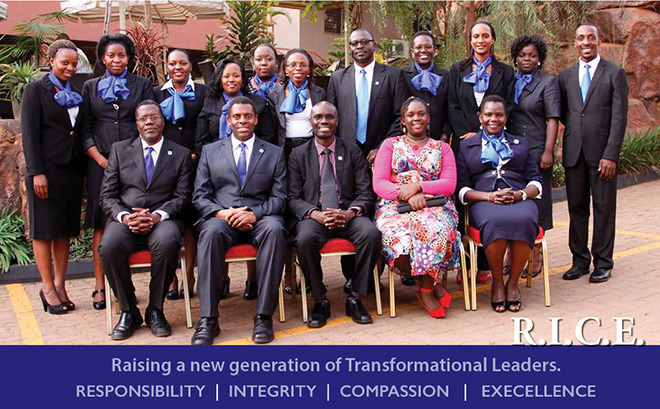
INTRODUCTION
The increasing complexity of issues being faced by contemporary African leaders is putting extraordinary demands on them at the local, national, regional, continental, and global levels. These issues include among others, security of people and property, provision of social services, prudent natural resources management, environmental protection, sustainable agriculture and sustainable tourism. Africa’s rapidly increasing population is currently estimated at 1.2 billion. If Africa is to preserve the small gains made in the 20th Century and open new horizons in the 21st Century, it is extremely important and strategic that her current and future generations of leaders in the public and private sectors to be exposed to responsible, integrity leadership and quality management principle. Such are the leaders that will lead Africa out of her present predicaments.
The pictures the world sees of the African continent and her people are grim. They are painted with the brush of poverty, sickness, civil strife, hunger, disease, corruption, weak economies, illiteracy, high child and maternal mortality, low life expectancy, deprivation, oppression, dictatorship, and hopelessness. Ironically, facts show that Africa is the most resource rich continent on the earth with vast untapped mineral reserves, fertile untilled farmlands, large fresh water bodies, a large population for self-sufficient capital markets and strategic positioning for global commerce. However, the level of hardship and destitution being experienced in many African nations today are unprecedented. Most countries with far less resources fare better than us. Why is this so?
History has shown that many formerly third-world countries such as Japan, Korea, Singapore, and India have transformed their economies and nations to first-world, or near-first-world, operational standards through strict practice and adherence to integrity leadership and quality management principles.
For Africa to advance beyond its current state of social and economic malaise, she must follow such models as Singapore by establishing a rigorous and aggressive program of developing disciplined leaders of disciplined thought in all spheres of influence. Such leaders will guide disciplined and strategic action towards moral, socially responsible and economically vibrant nations in Africa. While the international community may be willing to support and encourage us, in the final analysis, it is the responsibility of Africans far and near to arise and develop their continent. It will be highly irresponsible, and acceptance of second class citizenship to the rest of the world if we fail to do so.
For African societies to advance beyond their current state there must be a deliberate program of recasting the mould from which our leadership emerges, to one with greater emphasis on responsible leadership and effective management. This will require relevant and appropriate training from the grassroots to the top management levels.
THE INSTITUTE FOR NATIONAL TRANSFORMATION (INT)
The Institute for National Transformation (INT) was formed in Nigeria in November 2005 and registered as a non-profit company in November 2007. It was registered in Uganda as a non-governmental organization in November 2008. The INT mandate is to develop leaders with the mindset to transform their organizations, communities and nations. The Institute aims at developing leaders who are versed in integrity leadership and quality management practices.
The mission of INT is to develop values based “no excuse” leaders of integrity and exceptional organizational skills from both the private and public sectors throughout Africa.
This leadership will proffer performance instead of pronouncements, expertise and competence instead of title and position; bold developmental initiatives instead of seeking handouts; compassion for our people instead of dictatorship, control and abuse; and, legendary positive impact in the continent instead of failures and excuses.
To achieve this INT aims to develop leaders within the following spheres of society: Education, Business & Economy, Communication & News Media, Politics & Governance, Family & Social Services, Religion and Celebration (Arts & Culture, Sports).
VISION
Values-based, “no excuse” leaders transforming their organizations, communities, and nations to the highest levels of performance and achievement.
MISSION
To develop leaders of integrity, compassion, and exceptional organizational skills from both the private And public sectors throughout Africa that will proffer: performance instead of pronouncements, expertise and competence instead of title and position; pioneer bold developmental initiatives instead of seeking handouts as an answer to hunger and destitution; offer compassionate hands instead of dictatorship, control and abuse; and leaders who will LEAD their organizations, communities, nations and Africa to greater levels of success and, thus, leave legendary impact in the continent instead of failures, shame, and excuses.
GOALS
- To develop Leadership and Management competencies and the moral strength and the workforce of people of African descent worldwide by conducting regular training, seminars, and workshops in the areas of Integrity Leadership and Quality Management practices.
- To promote personal and collective responsibilities towards the development of families, organizations and communities, and ultimately, nations and Africa.
- To develop curricula that will produce CHANGE AGENTS who will exhibit three major characteristics:
i) Lead themselves through active, consistent, and challenging self-development journey;
ii) Pursue careers in public and private sectors, academic institutions, as well as national and international agencies and help lead those groups to their highest level of performance and achievement; and,
iii) Engage actively and work collaboratively with other groups towards the achievement of community, national and continental transformation.
- To facilitate the exchange of knowledge and professionals – nationally and internationally – between public and private establishments, through leadership gatherings and other means.
- To recognize and award Africans and people of African descent who have consistently practiced Integrity Leadership and Quality Management lifestyle.
- To establish alliances through appropriate Memorandums of Understanding. (MOUs) with Government, Community, Religious and International bodies with whom we share common vision in and passion on national transformation;
- To provide expert advice and trainings to public and private sector organizations, in the areas of Integrity Leadership and Quality Management Practices.
